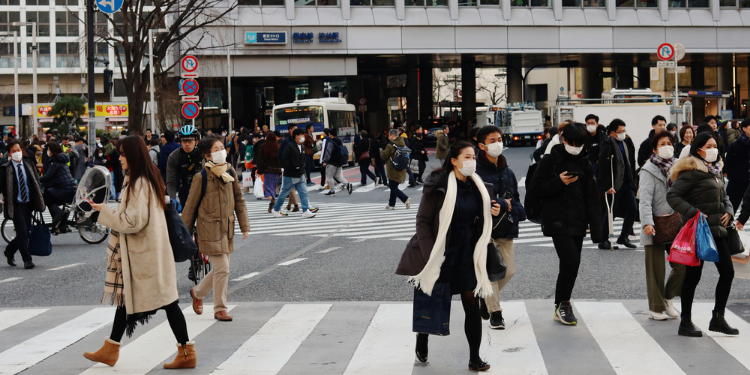
As of March 18, 2020, Japan had 1,592 confirmed cases of COVID-19, and a death poll of 29. Hokkaido, in the far north of Japan, is the most affected region, with 152 confirmed cases. Next comes Aichi, southwest of Tokyo (125 cases), and the very touristy Osaka (112 cases). Tokyo comes just behind, with 102 new infected cases.
Among the 1,547 cases, 712 were aboard the Diamond Princess. The last passengers of the cruise ship were evacuated on March 1st. Currently, 156 people are hospitalized. Overall, 859 tested positive for coronavirus.
These figures are disputed by part of the population, given the situation of neighbouring South Korea where there were 8,413 cases and a death poll of 91 (March 18). There are concerns that the government is willfully underestimating these figures. In Japan, the health crisis has been coupled with a political crisis.
State of emergency
Shinzo Abe establishes a state of emergency on March 13, 2020. The government, criticised for failing to take prompt action and lacking resources to counter the pandemic in an efficient way, is taking drastic measures. Shinzo Abe believes that the state of emergency law should help contain the health crisis.
Clearly, the government has been enabled to quarantine anyone suspected of being infected with the virus. Authorities can also order the closing down of establishments, ban gatherings, cancel public events, requisition public and private buildings to build medical structures, as well as basic necessities. The Prime Minister also warned that "individual rights might be overlooked" - which is a cause of worry for the opposition that finds the text outlines blurred. However, the government reassures that these measures will remain exceptional. Spokesman Yoshihige Suga stated that, "We are not currently in a situation of declaring a state of emergency."
Life in slow motion
Japan has closed all of its primary and secondary schools since the beginning of March, until the end of the month for now. However, preschools and daycare facilities remain open. In Japan, the school year ends in March and starts in April. The country is currently supposed to celebrate the end of school year ceremonies. Nevertheless, regions are able to decide on a case-by-case basis whether to maintain or cancel these celebrations. In Hokkaido, it is likely that they will be cancelled. Students are currently receiving their results by email. Some schools are holding the ceremony behind closed doors. Parents and other students are allowed to watch graduation outside on a television screen.
The government recommends remote working for businesses. As transportation, especially in big cities like Tokyo, is frequently crowded, remote working is expected to avoid the risks of contamination during rush hours. While some companies have fully implemented remote working, others are allowing part-time remote working - where employing spend half-day at home and the rest at the office. Others are allowing parents to take their children to work. Also, parents having a sick child are allowed to take leaves. Subsidies are being put in place to compensate for the lack of wages. On the practical side, hydroalcoholic solutions are provided at stations, public places, and businesses.
In the meantime, the younger generation doesn't look worried at all. The young and trendy districts of Harajuku and Shibuya, in Tokyo, are still as busy. Even though there is no confinement, respect for rules and hygiene is highly recommended. Many leisure and tourist spots are closed: amusement parks, museums, karaoke, etc. Some of them, like the Joysound karaoke chain, remain partially open.
The sports community is also seriously affected. Football championships have been suspended while sumo and basketball competitions are being continued behind closed doors. Triathlon has been postponed until at least April, for now. Gyms are closed as well. Most sporting and cultural events have either been cancelled or postponed.
Olympic Games, which were expected to start on July 24, remain a big question. A few days ago, government spokesperson Yoshihige Suga affirmed that they would be maintained, and this is supported by the speech of Prime Minister Shinzo Abe on Saturday, March 13. Tokyo Governor Yuriko Koike adds that it would be "unthinkable" to cancel the Olympics.
As of March 17th, however, it is increasingly uncertain whether the Olympic Games will be held. The Japanese fear the massive influx of tourists. The Olympic committee has been reorganised, and festivities around the Olympic flame have been cancelled. The flame will still leave on March 26 but in the absence of an audience. According to a survey by NHK, 45% of the Japanese are against the holding of the Olympic Games.
Should you leave Japan?
Many States around the world are calling their nationals back home. Japan, on the other hand, is prohibiting entry to any person having stayed in South Korea, China, Iran, Italy, and San Marino for 14 days, and giving the outbreak of the epidemic in Europe, France is likely to appear on this list too.
The USA is advising its nationals to avoid travelling to Japan and to defer any unnecessary travel. The country has also restricted access to its territory and is inviting its citizens who are currently present in Japan to come back home.
Same goes for the UK. All non-essential trips - including programs and other university exchanges - have been postponed, at least for one month. South Africa has closed all its borders and advises its citizens to avoid hotspots mainly in East Asia and Europe. France, Australia and Morocco recommend the same to their nationals. However, these recommendations do not apply to expatriates who have lived for several months or years in Japan. However, these countries recommend considering this option, especially for those who are planning to spend only a few months in Japan, given the situation.
Yer, it is still relatively easy to fly from Japan as air links are maintained. However, the Japanese government announced that the frequency of flights will be cut down gradually - especially international flights - while flights to particular countries will be suspended, even though no details have been given regarding these destinations. These measures are coupled with more strict travel conditions to countries like the USA, Canada, as well as Europe and Africa. These countries are taking similar measures and are gradually closing their borders.
But none of them has taken repatriation measures. Planes dispatched at the start of the crisis are no longer relevant are air links are still operational according to embassies. Travellers are therefore advised to inquire with their airline for any issues relating to departure (change of flight, etc.) Narita International Airport has strengthened its control and security measures. Employees are required to wear a mask, common spaces are being disinfected, and travellers are advised to follow the rules of hygiene. There is no particular procedure to follow, except to comply with instructions given by Japanese authorities, until their departure. Since March 13, Japan can quarantine anyone suspected of having contracted the virus, including foreigners.
Should you travel to Japan anyway?
Relocating to Japan, Working Holiday Visa or studies are projects that are hard to postpone, especially if they have been planned for a long time. The Japanese government nonetheless calls for the greatest caution in the face of the pandemic. Japan recalls that travelling in spite of the pandemic means increasing risks of exposure to the virus and contamination - thus making you a potential risk for others.
According to Asahi newspaper, all travellers from Europe, foreigners and Japanese alike, will have to remain in solitary confinement for two weeks, even if they have no symptoms (information from March 17). This is confirmed by the Japanese government in an article published in the NHK.
While some specialised travel companies are pointing out that Japan is one of the safest countries in the world, travel and entry conditions have been tightened, calling for everyone's responsibility. Japan thus shows its priority to protect the people currently present on its territory.



















